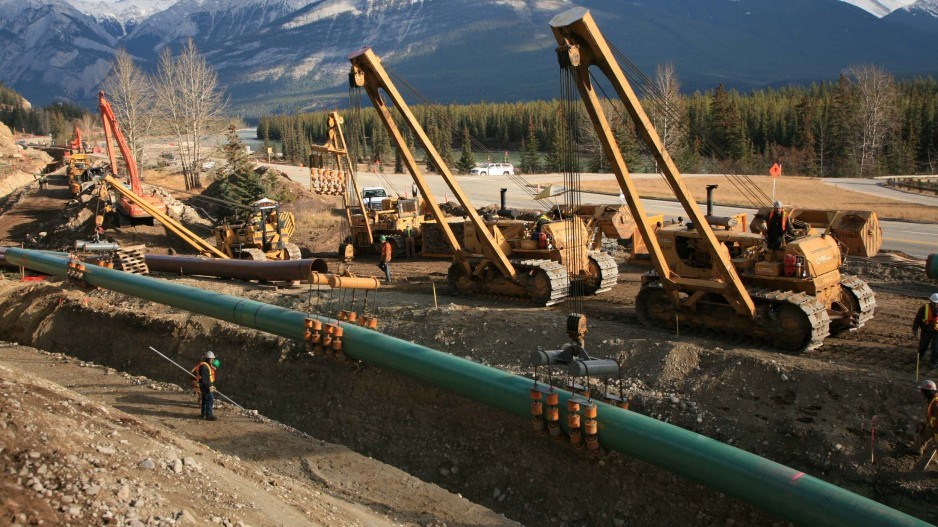To date, Enbridge Inc.’s (TSX:ENB) Northern Gateway pipeline has taken most of the heat from a public worried about B.C. oil spills.
But a $4 billion plan by Kinder Morgan Inc. (NYSE:KMI) to twin its 60-year-old Trans Mountain pipeline is starting to generate some heat of its own. First Nations, citizens groups and municipal governments are lining up to oppose it over the apparent imbalance of environmental risk and economic benefit.
Unlike Northern Gateway – a new pipeline proposal that, if built, would supply foreign markets with Alberta crude – the Trans Mountain pipeline is vital to B.C., providing 80% to 90% of the Lower Mainland’s gas, diesel and jet fuel.
The pipeline moves crude from Alberta as well as refined petroleum products (gas, diesel and jet fuel). Under its current capacity, the Chevron refinery in Burnaby can only get about a third of what it needs from the pipeline for refining purposes.
“Since 2010, the pipeline has been heavily oversubscribed by non-B.C. shippers,” said Ray Lord, public and government affairs for the Chevron refinery.
Chevron supplies 25% to 30% of the Lower Mainland’s gas and diesel. When it can’t get enough crude for its needs from the Trans Mountain line, it has to bring it in by truck from Alberta and Manitoba.
Chevron supports any expansion that would increase its access to Alberta crude, Lord said.
But increasing the supply of crude or refined petroleum to B.C. isn’t why Kinder Morgan wants to expand the pipeline – it’s to meet the growing demand for Alberta oil from offshore and U.S. refineries in California and Washington State.
“The demand in the Lower Mainland is flat,” Kinder Morgan Canada president Ian Anderson told Business in Vancouver. “It’s the offshore market and Washington State whose demand is going up.”
The expansion would increase capacity from 300,000 barrels of oil per day to 750,000, and increase tanker traffic in Burrard Inlet from five per month to between 20 and 25 per month. The oil tankers fill up with crude at the Westridge marine terminal in Burnaby.
More than half of the oil moving through an expanded Trans Mountain pipeline would be for export – about 55% – according to Anderson.
Burnaby mayor Derek Corrigan says it’s absurd for British Columbia to assume the increased risk of an oil spill, given that the expansion is about serving foreign markets, while a local refinery can’t get enough raw product.
“You can’t even get a guaranteed supply to your domestic oil refinery at market rates, which is ridiculous,” he said. “We are already exporting three-quarters of the oil that’s coming down the pipeline.”
Asked why British Columbians should support the Trans Mountain proposal, when it has little to do with serving domestic needs, Kinder Morgan’s Anderson said the pipeline will create jobs and add billions to Canada’s GDP.
“We’re going to spend $3 billion in the province that’s going to generate GDP of $3.5 billion for the country,” he said. “We’re going to have labour income of $2.3 billion and we’re going to create 46,000 person-years of employment.”
He added the annual property taxes Kinder Morgan pays to municipalities would increase from $21 million to $41 million.
If the twinning plan is rejected, Anderson warned Chevron would continue to face stiff competition for space on the existing pipeline. “The expansion’s providing security of supply for the Lower Mainland and Chevron, because they’re having to compete today.
“The refinery in Washington State wants to take more. Under an expanded pipeline, the certainty of that space into that refined product market in the Lower Mainland becomes much more certain.”
The Trans Mountain twinning proposal is still in early innings. Kinder Morgan has yet to file for an environmental assessment, so it would be years before Chevron might see any increased access to Alberta crude under a twinned pipeline.
In the meantime, Chevron has applied to the National Energy Board for priority access on the pipeline. •




